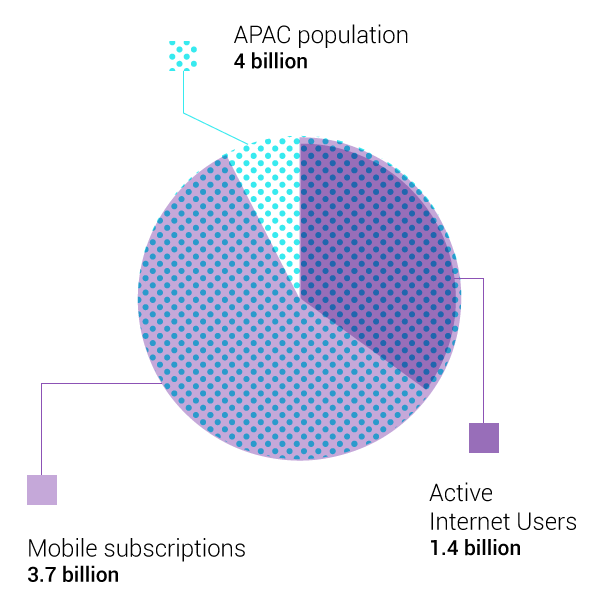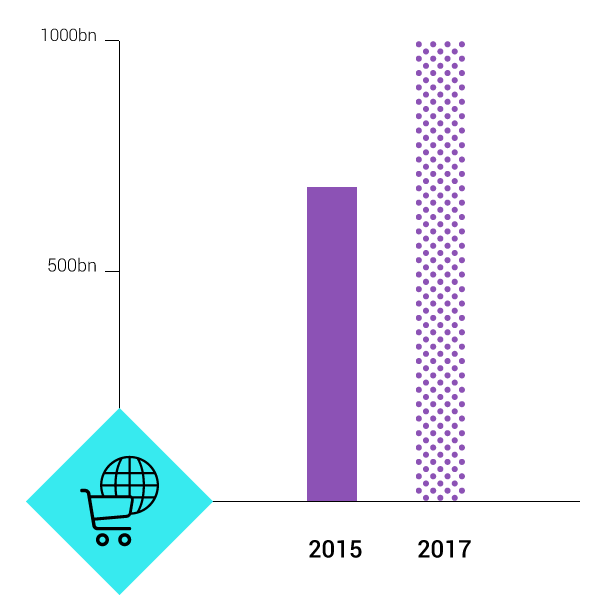
E-commerce sales in Asia Pacific are estimated to reach USD 681 billion in 2015, rising to USD 1 trillion in 2017.
SparkLabs Global Asia E-commerce Report, February 2015
Yes, technology is transforming Asian consumerism. But you knew that already. Here’s the catch: technology alone is NOT the point.
It's not the technology that changes the world. It's the dreams behind the technology.
Not our wisdom, but that of Jack Ma, founder of Alibaba ;)
Yes, the numbers on digital tech in Asia are amazing. But that’s precisely why it’s all too easy to get fixated on the technologies and miss the real point. What matters most is actually the supercharged lifestyles – the dreams – that technology enables. Because in the end, consumerism is still (and always will be) about people and their fundamental needs and wants.
So if you came here thinking you’ll read about the growth of wearables, the advent of smart cities, the Internet of Things, and all the other widely-covered tech trends, you’re going to be sorely disappointed. You know about those trends already. But what can you do with them?
In this Trend Bulletin, you’ll find four new tech-fueled opportunities for you to innovate around. Learn, adapt, innovate, find new ways to serve fundamental needs… and profit!
Four tech-fueled trends reshaping Asian consumerism in 2016 and beyond.
1. ALL ON MESSAGING
Messaging platforms as a remote control for day-to-day living.
2. DISCOVERY DIRECTORY
Directories for a new, fuzzier consumer arena.
3. BOTTOM OF THE (SMART) PYRAMID
BOP consumers meet cutting-edge digital tech.
4. DIGITAL DISCIPLINE
The pursuit of online/offline balance.
1. ALL ON MESSAGING
Messaging apps become remote controls for day-to-day living.
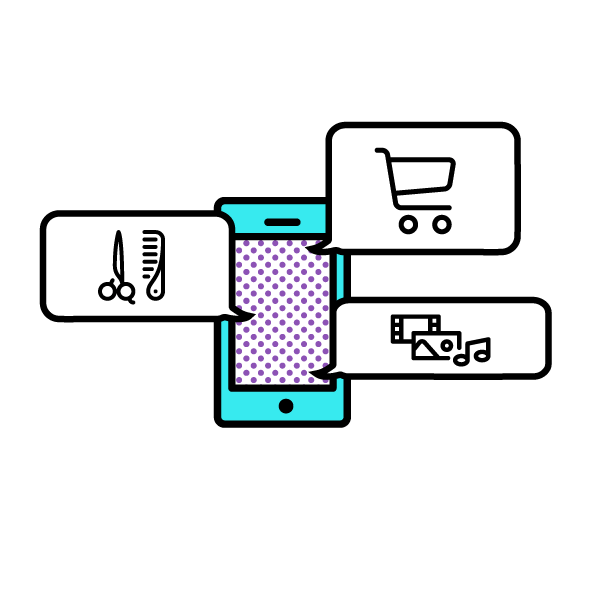
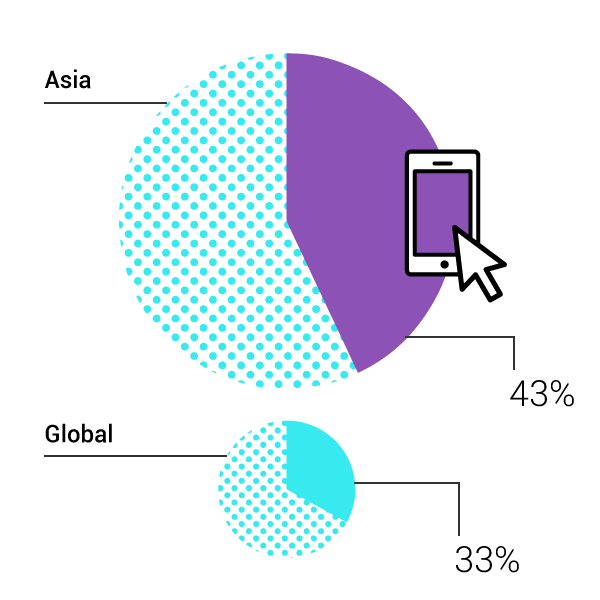
43% of web traffic in Asia comes through mobile. Globally, that figure is just 33%.
We Are Social, March 2015
Messaging app ecosystems are EXPANDING.
In fact, it's probably time to stop calling them 'messaging' apps ;)
By Q1 2015, WeChat had 549 million active monthly users. For LINE, that figure was 205 million. It’s little wonder that mobile messaging apps are now the go-to channels for brands to reach consumers.
On top of that, Asian consumers love digital CRAMMING – having multiple features available in one platform. Mobile apps like WeChat and LINE have steadily built ecosystems of their own: in-app shopping and flash deals, games, content, cute stickers (of course!) and more.
But now, the consumer’s expectations are broadening – they want to do more. Smart brands are responding by using messaging apps not simply as shopping and content channels, but to offer lifestyle solutions, solve social issues, provide financial services, and ultimately make individual and community life better.
So, are you ready for the messaging app as a remote control for day-to-day living?
Shanghai government and FoodPanda on WeChat
Business providers latch on to the WeChat ecosystem
As part of their WeChat City Service partnership with the Shanghai government, in April 2015 WeChat rolled out new functions allowing users to check the nearest hospitals and recommended doctors, make medical appointments, pay for utility bills through the WeChat wallet, access Hong Kong, Macau and Taiwanese visa services, check their driving penalty points and browse books at the Shanghai Library.
Previously, in December 2014, the messaging app had partnered with food delivery service FoodPanda. In Hong Kong, Thailand, Singapore, Malaysia, Taiwan, the Philippines and India, users can search for nearby restaurants and order food within WeChat.
Grocery deliveries and Burberry on LINE
Brands on the LINE platform are going beyond cute stickers
February 2015 saw LINE launch an online grocery delivery service in Thailand. Users can follow specific accounts that offer daily promotions on a variety of goods for free next-day delivery. Payments can be made via LINE Pay.
In the same month, Burberry partnered with LINE to live-stream its runway show. Using the app’s mobile live cast function, LINE users in Japan could watch the Burberry Prorsum Autumn/Winter 2015 womenswear runway show from London Fashion Week in real-time.
Delhi Police Department and Homework Gods on WhatsApp
WhatsApp is increasingly used as a platform to create shared solutions
August 2014 saw the Delhi Police Department launch an anti-corruption helpline encouraging citizens to register complaints via the US-based messaging app WhatsApp. The initiative allows members of the public to send in audio or video clips if they witness officers seeking bribes or harassing people.
A lighter, but no less beneficial, use of WhatsApp was demonstrated by Singapore-based Homework Gods, first spotted in March 2015. Students in need of academic-related help can message a number via WhatsApp, and the ‘homework gods’ will reply with answers and solutions.
NEXT?
This trend spells massive opportunity. How to apply? Partner with the messaging platform your target audience is already using. Think about how you can make familiar processes easier and faster, offer content that's genuinely new, or provide useful new information. And yes, the same thinking can be applied to other social platforms, too. See how Kotak Mahindra Bank launched a Twitter-based savings account in India.
2. DISCOVERY DIRECTORY
Directories for a new, fuzzier consumer arena.
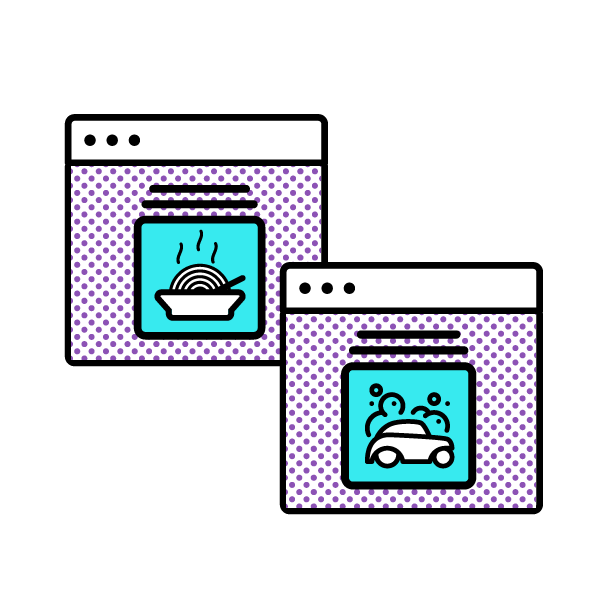
P2P. Social shopping. Suppliers in unexpected places. It's a confusing world out there.
Luckily, a familiar breed of website can help.
The rise of online culture and e-commerce has blurred the boundaries that previously defined the consumer arena. That means all kinds of new products and services, suppliers, and marketplaces, as well as the ability to organize access to resources in new ways.
Exciting? Sure. But all that adds to the choice paralysis that afflicts so many consumers today. Now, new directories and platforms are springing up to help consumers navigate the consumption-sphere in 2015: one filled with social media sellers, online local tradesmen, parking spaces for hire, and much more.
That means better decisions, with minimum effort.
Oiffel, Kleora and Shopious
Online aggregators help consumers discover Instagram shops in Indonesia
Online shops selling their wares through Instagram are rife in Indonesia, but they are often not very visible or easy to discover by potential customers. Indonesia-based platform Oiffel aims to solve this problem by aggregating all the goods sold on Instagram. Launched in Q1 2015, it saw 400 online shops sign up in the first three weeks.
Oiffel currently competes with other aggregators such as Shopious and Kleora, both also Indonesia-based and launched in 2014. Shopious is also an Instagram store aggregator but focuses specifically on fashion items, while Kleora aggregates stores selling women’s products from Facebook and Twitter as well as Instagram.
HandyHome and PageAdvisor
Online directories for domestic home solutions
HandyHome is an app that aggregates the service centers of various home appliance brands in India. When an appliance is in need of repair, users can go to the app, select appliance details from a drop-down menu. HandyHome then sends a trained member of staff at the requested service time. Launched in January 2015 with an initial USD 15,000 seed capital, HandyHome is already processing 100 requests a day.
Singapore-based Page Advisor is a startup that compiles 39 types of home and lifestyle services, connecting customers with small and medium-sized local merchants. Offerings include dog training, piano tuning and private chefs. Launched in May 2015, Page Advisor received over 1,000 job requests and 167 appointments within the first two weeks of operation.
Parking Duck
Online marketplace helps drivers find parking spaces
Launched in Bangkok during December 2014, Parking Duck is an online marketplace helping drivers find alternative parking spaces. Individuals and companies with unused capacity on their property can list spaces on Parking Duck for free and earn parking fees from drivers looking for parking spaces.
GottaGo
Mobile app lists nearby restrooms
India-based app GottaGo generates a list of nearby accessible restrooms that are clean and hygienic. Users can also search for restrooms based on street or place names. As of July 2015, the free app listed over 10,000 restrooms, mapped across public places in Mumbai, Pune, Delhi NCR, Bangalore, Chennai, Hyderabad, Chandigarh and Jaipur.
NEXT?
Think about everyday painpoints where consumers need information but do not want to invest time and effort on the search process. Create directories for the most unlikely services, from public toilets and parking spaces, then go one step further and facilitate instant purchase!
3. BOTTOM OF THE (SMART) PYRAMID
BOP consumers meet cutting-edge digital tech.
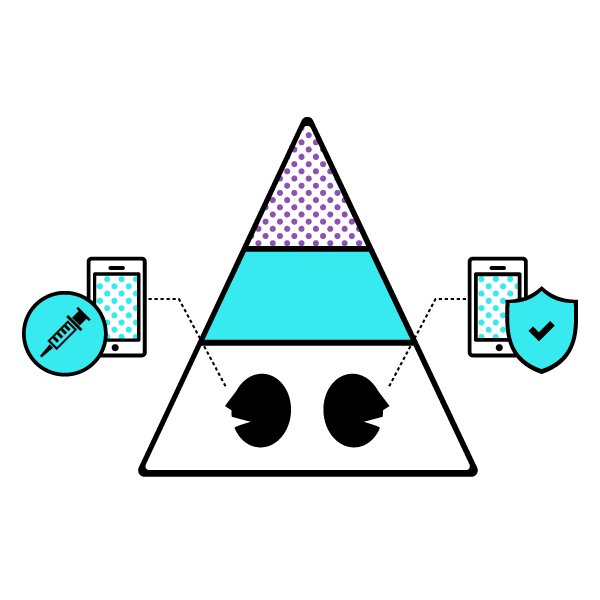

From 2014 to 2015, the number of internet users in Cambodia and Myanmar grew by 414% and 346% respectively.
We Are Social, March 2015
52% of the population in the ASEAN markets reside in rural areas.
These markets are driving much of Asia's growth.
We constantly hear about Asia’s new, affluent, urban middle class. But the fact remains that most countries in the region are still developing.
Countries including the Philippines, Vietnam, Indonesia and India all have internet speeds below the global average, but users in these regions spend the most time on the internet when compared to their Asian counterparts (We Are Social, March 2015).
BOP engagement with tech is certainly not new (feature phones!), but – in a time when even Ojeks and rickshaws are getting a digital makeover – expectations around technology are also rapidly changing. Now, the Asian BOP are making use of cutting-edge technologies that can solve shared problems, make people safer, and improve quality of life. Fishermen using satellite tech to locate the best haul, anyone?
So when you’re thinking about tech innovations for BOP consumers – think smart.
Khushi
Smart necklace for kids keeps track of vaccinations
Reaching its crowdfunding goal in December 2014, Khushi is a smart necklace designed for infants in the developing world, starting in India. The USD 25 necklace includes an NFC chip that can be quickly scanned by community health workers to find out which immunizations are needed by the child. The device replaces traditional vaccination logbooks which are slow to search and often incomplete.
mFish
Mobile app helps Indonesian fishermen locate the best spots
Created by Indonesian telco provider XL Axiata and US-based developer Tone in partnership with the US and Indonesian governments, mFish is a mobile app that helps fishermen in the Indonesian island of Lombok find the best places to fish. Using US satellites, the free app directs users to waters containing the highest concentrations of plankton – a key indicator of areas rich in fish. The app also gives access to weather updates, chat rooms and a mobile data plan subsidized by nonprofits. In April 2015, mFish expanded to Bali.
The Escalator Project
Mall-generated electricity powers rural Indian villages
Announced in April 2015, The Escalator Project is an initiative from K Raheja Corp providing rural homes with electric lights. The Indian real estate group provided 50 homes with lamps using rechargeable batteries which could be charged via dynamos in escalators at the K Raheja Corp-owned InOrbit Mall. Charged batteries are swapped each week, in order to ensure a consistent supply of light.
PawnHero
Online pawn shop opens in the Philippines
February 2015 saw the launch of the Philippines-based PawnHero: the first online pawn shop in Southeast Asia. Individuals wishing to pawn items such as gadgets, electronics, jewelry or luxury purses take a photo of their valuables to receive a quote within minutes. Items can then be dropped off at any 2GO outlet or be picked up by the logistics service for free. Once PawnHero receives the items, they are checked and funds are deposited in the seller’s bank account or to a PawnHero ATM card.
4. DIGITAL DISCIPLINE
Forget digital detox – it's all about discipline.

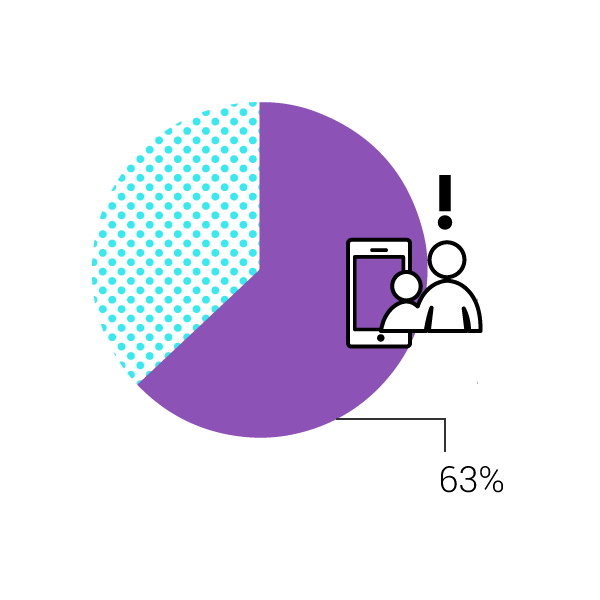
63% of Japanese parents worry that their kids will become addicted to smartphones.
TOKYO METROPOLITAN GOVERNMENT, DECEMBER 2014
Admitting you have a problem is the first step.
But Asian digital addicts don't want cold turkey – they just want to manage their habit ;)
Last November we wrote about DIGITAL DISCIPLINE, highlighting how it will be one of the biggest topics in consumerism this year. Since then, it’s edged ever-closer to the mainstream.
Indeed, January 2015 saw the Taiwanese government pass legislation obliging parents to limit the amount of time their children spend on digital devices.
Of course, for most consumers switching off entirely – even for a few days – just isn’t an option. So now, innovative brands are helping consumers cultivate healthier relationships with their digital devices, instead of depriving them altogether.
Reebok
Subway game in encourages South Korean commuters to look up from phones
In Q1 2015, Reebok promoted their ZPump Fusion sneakers with a campaign that encouraged Korean commuters to look up from their mobile phones and get active. In a Seoul subway station, the brand installed a game called Subway Pump Battle. Two commuters were chosen at random and invited to participate by pressing as many pump buttons as possible in an allocated time. The winners received a pair of Reebok sneakers.
McDonald's India
Fast food chain encourages diners to reconnect offline
In April 2015, McDonald’s India launched a campaign to inspire people to ‘Share quality offline moments’. The campaign encouraged customers to connect with friends and family offline, and spread the word with the #KuchPalOffline hashtag. Anyone using the hashtag online was automatically entered into a draw to win a day-long adventure trip with their friends. The campaign’s TV ad shows young people choosing to place their cellphones upside down and start a conversation with their friends.
Oppo
Smartphone brand tells Vietnamese dads to put down phones
December 2014 saw smartphone maker Oppo launch a campaign in Vietnam discouraging dads from using their smartphones. The campaign argued that many important father-child activities, such as teaching a child to swim, or building a toy together, require two hands. This campaign was developed in conjunction with Oppo’s sponsorship of South Korean reality show ‘Dad! Where are we going?’, in which father-child teams compete to perform tasks without the help of technology.

